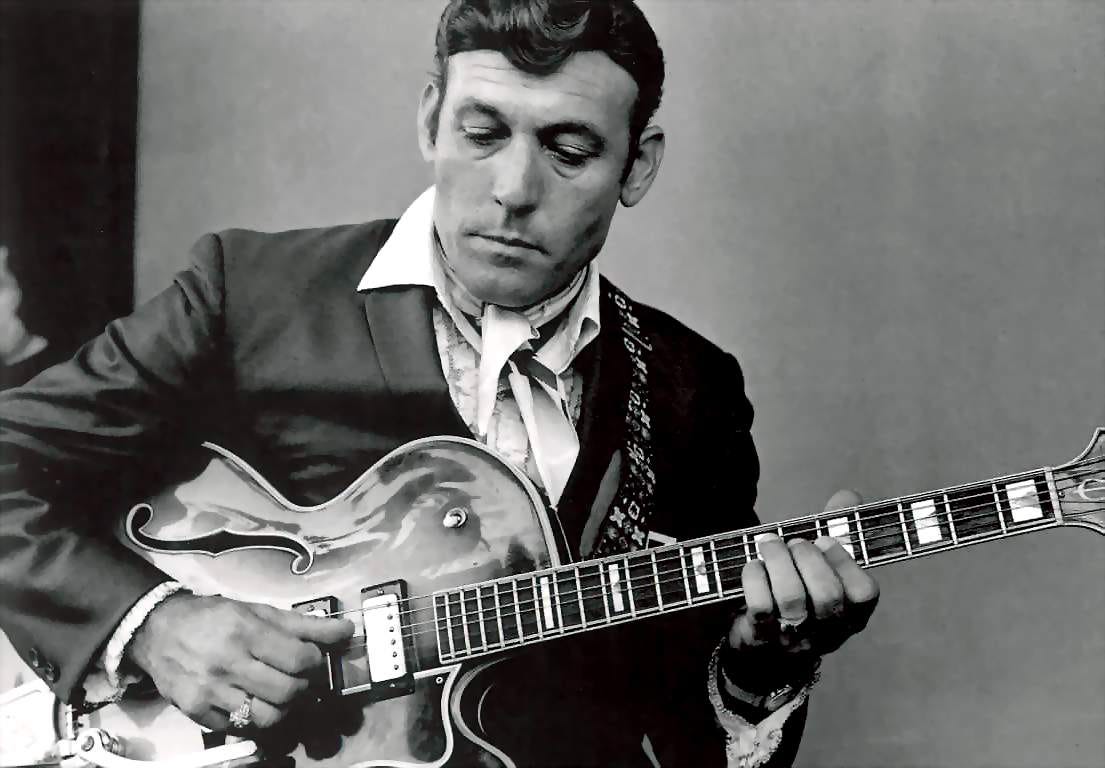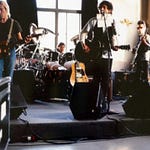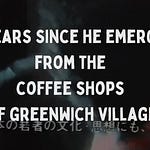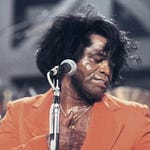This interview took place backstage at the Bijou Café right before Carl Perkins was to do his first show in Philadelphia in years with a band that included two of his sons. It was a rare occasion and I don’t believe he ever returned. At the time he had a new album out that pretty much ended up going nowhere and I’m not sure if the album he talks about at the end of the interview ever was released.
For whatever strange twist of fate, that’s the way it was for Carl Perkins, a man who was recognized by musicians more than anyone else, though in many ways he was easily as talented as the rest of the artists on Sun. For Perkins, it was bad luck -- a car crash on the way to his Ed Sullivan appearance and that crash seemed to set the tone career-wise for the rest of his life. If Perkins had any bitterness it wasn’t apparent. He was one of the friendliest and nicest people I’ve ever met.
PSB: When did you first start playing?
Perkins: I started playing back about as far as I can remember. I was about 5 or 6 years old when I got my first guitar. Of course, I liked country music. I grew up on a cotton plantation in West Tennessee . But I also liked the black blues and I liked the southern gospel spiritual music. So, what I did was try to play country music with a black man’s rhythm and it came out as rockabilly music. But I loved guitars all my life. Ever since I can remember, I wanted me as guitar as a little kid, and finally got me a little cheap one and I just lived with it in my arms. I loved it.
Can you talk a little about Memphis and the scene around Sun studios? I saw a picture of you and Elvis and Jerry Lee Lewis and Johnny Cash standin’ around a piano.
It was a great era, it was a great time. There was no jealousy at Sun record company between say Elvis, Johnny Cash, Jerry Lee Lewis, Roy Orbison, Charlie Rich and myself. We were all poor boys. By poor I mean, poor! We didn’t have nothin’ you know and everybody was really wantin’ everybody else to do good and there was no jealousy. When one recorded it was nothin’ to look around and see Johnny Cash or Charlie Rich sittin’ in the studio wishin’ you well. It was that type of thing. It was one of the greatest labels, greatest atmosphere at 706 Union Avenue . It was a very small place, but there was a lot of devotion to what we were doing, individually plus collectively. Everybody was for Sun Record Company. It was kind a little tight package down there for a couple of years.
Was there ever any jamming?
Oh yeah. That was done quite a bit. In fact, you mention this picture of Elvis, Johnny Cash, Jerry Lee and myself. There has now in the last year surfaced an hour and fifteen minutes tape of us singing and picking together. It’s in court in Tennessee right now as to who actually owns that piece of tape. This happened at a session of mine. The session that I recorded “Matchbox” and “Your True Love.” And my lawyers think because I paid for it that it might be mine. Of course some other people, Shelby Singleton who bought the Sun tapes feel like it’s his. So I don’t really know. I do know that this album will be out pretty soon. I’ve got a copy of it and it’s not that bad at all. It’s better quality than I ever thought it was. I really didn’t know, or did any of the guys know that it was being recorded. But it’s a strange thing, an hour and fifteen minutes and there’s not a dirty word on it. But it’s a jammin, talkin’ stompin’ songs, that say “Hey man, let’s do it this way.” But it’s Elvis as I have really never heard Elvis on record. He’s happy. You can hear the dialogue in between the songs. We talk about different things. But it’s a great collectors item. My guitar playing is horrible on it ’cause we were playing songs I never heard or songs I that I’d never tried to play. But that’s beside the point. It does exist. It will be out. I’d say sometime early next year.
What were the early rock and roll tours like?
They were very exciting. The music was new, the kids were just eatin’ it up. They were claiming it as their own music. But I really think when the kids were comin’ to the sock hops and to the rock and roll shows, I really sincerely believe that mom and dad was home tryin’ to learn how to jitterbug to those same records. I never really thought that the kids were buyin’ all of those millions of records back then and I think time has proven that the older folks like it too. They just kind of rebelled against it a little bit because they first said it was bad music, they said it would entice our teenagers wrong, but it really wasn’t. It was music that made you feel good. They danced to it and I think time has proven that it was worth recording because it’s still around and never did leave.
You had considerable influence on The Beatles. They did quite a few covers of your songs. Did you ever meet them?
Yeah I did. I met the Beatles in ’63 just prior to them comin’ to America . In fact, they invited me to the recording session that they recorded three of my songs that night. I was settin’ in the studio when they recorded it. In fact, I wasn’t playin’ on any of the things that was released, but we did jam around and play a lot in the studio that night. Of course, I didn’t know, but they knew all of my old songs. I must say I was very impressed with The Beatles before America really knew about The Beatles. I was surprised that they did as well as they did, but not entirely surprised. I knew they were very talented guys, individually and as a group too. Paul McCartney and John Lennon, no question, history has to say they were the couple of best songwriters that ever came down the pike. I think songs like “Yesterday” and “Michelle” are masterpieces among many. Those two happen to be my favorite Beatles songs, plus I like the way they did “Matchbox,” “Honey Don’t” and “Everybody’s Tryin’ To Be My Baby.”
Then you were part of the Johnny Cash Show for a while and when you were with him you wrote one of his biggest hits, “Daddy Sang Bass.” What was touring with Johnny Cash like?
Well, it was a great experience. I did work with Cash for ten years. Johnny Cash and I back in the early days at Sun, I’d say was probably, we were the best of buddies there. I think I was closer to say, John, than I was Elvis, or Jerry Lee, Charlie Rich and the boys. Johnny Cash and I, and my background kind of was paralleled. He grew up the son of a sharecropper, picked that cotton in the fields. The Mississippi River divided us but our lives were so much alike that when I got to know John in ’55 I really liked the dude. He was real quiet, but he would talk if he was talked to and I like that kind of man. I like everybody at Sun. But probably, no question, Johnny Cash and I even back then were the best of friends and it kind of came by accident that I stayed with him for 10 years. I had a shotgun accident. I almost blew my left foot away and John came by to see in my home in Jackson , Tennessee and I’d been settin’ around the cast for four or five weeks, and I was kind of irritable. I’d broken a few crutches against the wall and he said, “Man, come go with me. I’m goin’ to Chattanooga , Tennessee and Atlanta , Georgia , we’ll come back through here and I’ll bring you home.” So I thought about it a few minutes and said all right, I’ll go. So with my crutches and my cast, I climbed on Johnny Cash’s bus. He called me out on the stage which I told him not to do, but that’s John, he introduced me and I did a couple of songs, standin’ out there with the cast on. On the way back from Atlanta after the second day, he asked me would I join his show. He said, “I’d love to have you man.” So that I did and it lasted ten years. And it was ten great years. I played before literally millions of people that I wouldn’t have gotten a chance to play before plus I was in the company of what I consider one of the greatest men in the music business. Johnny Cash is a humanitarian, a very charitable man. He’s concerned about the poor, the down-trodded people of this country and does a lot more than is printed. He’s a fine dude. We need a lot more like him. I love the man, I really do.
Could you talk about why so many of the original Sun artists seem to wind up recording in Nashville and do you think the Memphis sound has had an effect on the Nashville sound and vice versa?
I think one of the main reasons that the Memphis boys left the Sun stable was because of better contracts, better deals. We started there, we loved it and it was the first place we recorded, but bigger labels paid better money. So, all of the big labels recorded in Nashville , Tennessee and that’s why everybody wound up recording there. But yeah, I think the Memphis sound definitely has eased into Nashville and vice versa.
On your new record you get back to both sounds. It’s definitely back to straight-ahead rock and roll than some of the stuff you put on Columbia .
I appreciate you noticing that, I do, because that’s what I want to be, that’s what I’ve always been. I was recorded, I always felt on a lot of labels who really didn’t know what to do, or how to record me. I think now, with Felton Jarvis producing me, Felton knows my limitations or my capabilities and I think the combination if I’m ever gonna sell any records again, I think it’s gonna have to be Carl Perkins with his guitar and his rockabilly beat. And I couldn’t be happier about it because I’m gettin’ to do what I wanna do now and the deal I have with Jet Records is I make the albums and send ’em the tapes. They don’t take from or add to. An artist couldn’t ask for a better deal than that ’cause it gives me a chance to write my songs and do what I want to do. That’s what I’m gonna do in the future. It’s gonna be rockabilly music.
There seems to be a great resurgence of interest in that at the moment.
This is the last night of a five-and-a-half-weeks tour for me. This tour started in San Francisco , California the 21st of last month and I’ve been to Palo Alto , Los Angeles , Atlanta , Cleveland , Detroit , Washington , New York and now Philadelphia . I have noticed in all of the cites a definite feel, not only from the audiences that I’ve played to, but from just talking to people, d.j.’s in all of these cities, everybody’s sayin’ that this kind of music is gettin’ played again and it’s being recorded again more simple. Because as I said earlier it really has never left. They dressed it up a lot in the last ten years, put a lot of sounds on it, but the beat’s always basically been there and I think maybe it’s simplifying itself back to the point where if a young man wants to get in the business, he don’t have to fifty-thousand dollars worth of electrical switches and amplifiers to be able to play like Carl Perkins. I hope that maybe it will simplify itself. It will be good for the business because more kids will want to learn how to play because if he wants to buy him a little simple guitar, he can definitely learn how to play as good as I play. And I don’t think it’s been hardly fair for him to try and duplicate what he’s heard on some of the records when the cat that put it on the record couldn’t do it if he didn’t have twenty-five-thousand dollars worth of electronics. So maybe it’s simplifying itself back to the basics. I hope it is. Maybe if for no other reason than it will help our business. There’s not question that there’s gonna be some youngsters come on who say I can learn to do that too, and that’s good.
Have you heard this local group around here called George Thorogood & The Destroyers?
I have and they play the old basic rock and roll. That says it is easing back a little bit. I see it happening all over the country. It’s very very big in England , it’s big in Europe all over. I just was over there back in April and I was there for two months and I was all over Sweden , Norway , crowd’s tremendous, reception just couldn’t have been better, and it’s happenin’ in America . I really feel it may be easing back and I hope so.
On your new record you do a lot of covers and new versions of your hits and now that it seems you have a good recording deal, do you plan to take it from here and get into your own stuff?
Oh yes. Before I left on this tour, I cut a new album. This is album will be released in England next month and there’s six brand new songs on there, and there’s three songs that Elvis Presley would have done had he lived. Felton Jarvis was holdin’ ’em for Elvis and gave ’em to me and theyre three really great songs. A couple of ’em are really good rockers and one of ’em is a thing called “Miss Misunderstood” that I’ll do it tonight on the show.













Share this post